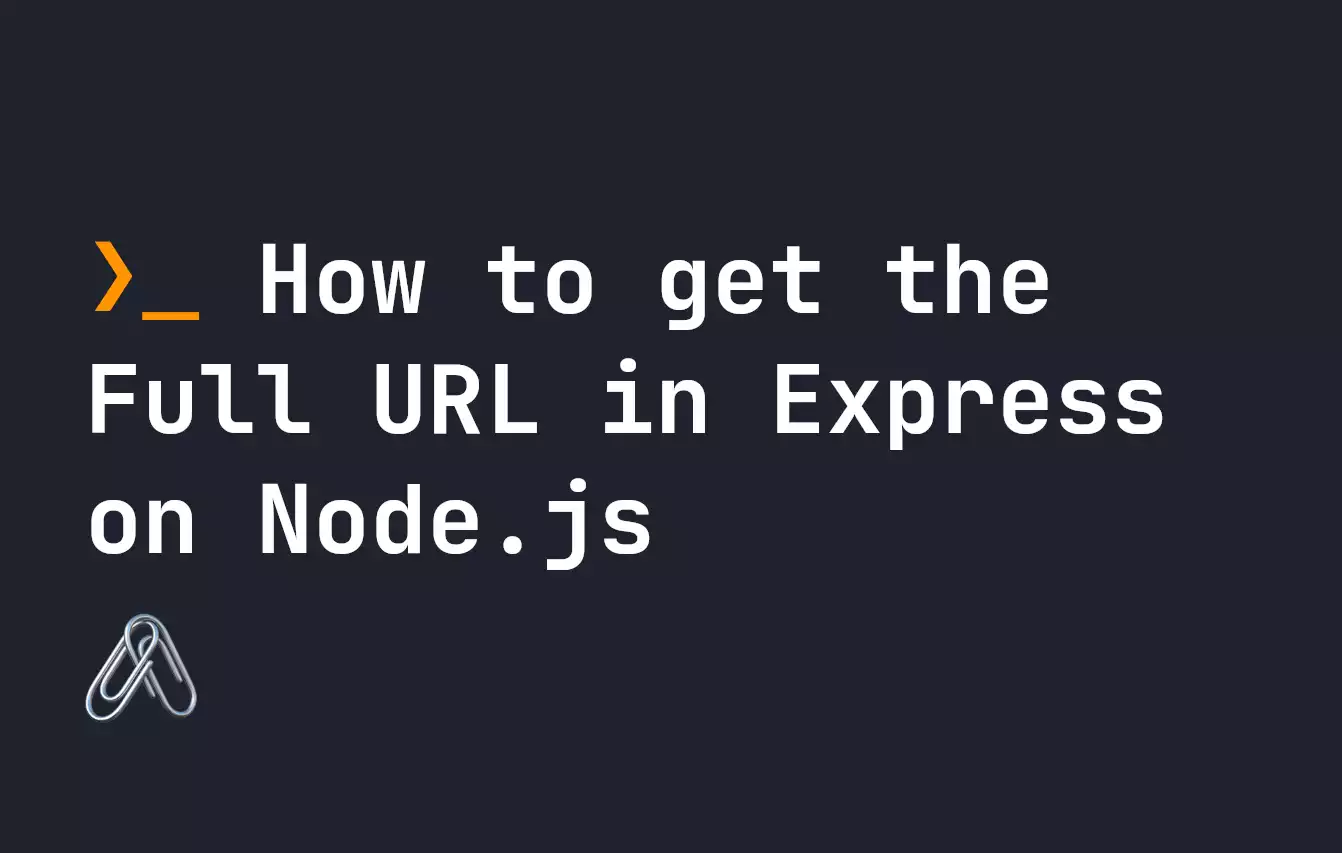Get Full URL in Express.js
Learn how to access and utilize the complete URL, including query parameters and path segments, within your Express.js application for effective routing and request handling.
Learn how to access and utilize the complete URL, including query parameters and path segments, within your Express.js application for effective routing and request handling.
In Express.js applications, retrieving the complete URL of a request is essential for various tasks such as logging, redirection, and link generation. This guide will walk you through the process of obtaining the full URL using properties of the req (request) object and demonstrate different methods to achieve this. We'll explore techniques like direct concatenation, utilizing the url.format() method, and creating custom middleware for convenient access to the full URL throughout your application.
Express.js provides several properties within the req (request) object to access different parts of the URL. Here's how to combine them to get the full URL:
1. Accessing Request Object Properties:
req.protocol: This gives you the protocol used (e.g., "http" or "https").req.get('host'): This returns the hostname (e.g., "localhost" or "www.example.com").req.originalUrl: This provides the complete path and query string of the URL (e.g., "/users?id=123").2. Constructing the Full URL:
app.use(function(req, res, next) {
const fullUrl = req.protocol + '://' + req.get('host') + req.originalUrl;
console.log(fullUrl); // Output: http://localhost:3000/users?id=123
// ... your further logic here ...
next();
});Explanation:
app.use() that will be executed for every incoming request.req object.fullUrl variable now contains the complete URL of the request.fullUrl variable for various purposes within your application, such as logging, redirecting, or generating links.next() to pass control to the next middleware function in the chain.Alternative Approaches:
url.format(): The url module provides a format() method that can be used to construct URLs from their components.const url = require('url');
app.use(function(req, res, next) {
const fullUrl = url.format({
protocol: req.protocol,
host: req.get('host'),
pathname: req.originalUrl
});
console.log(fullUrl);
next();
});fullUrl property to the req object for convenient access throughout your application.app.use(function(req, res, next) {
req.fullUrl = req.protocol + '://' + req.get('host') + req.originalUrl;
next();
});
// In your route handlers:
app.get('/users', function(req, res) {
console.log(req.fullUrl); // Access the full URL directly
// ...
});Remember: Choose the approach that best suits your application's needs and coding style.
This Express.js code demonstrates three methods to obtain and use the full URL of a request within an application. A middleware function is defined to construct the full URL using manual concatenation, the 'url.format()' method, and by adding a 'fullUrl' property to the request object. An example route showcases accessing and sending the full URL back to the client.
This code demonstrates how to get the full URL in an Express.js application using the methods described in the article:
const express = require('express');
const app = express();
// Middleware to construct and log the full URL
app.use((req, res, next) => {
// Method 1: Manual Concatenation
const fullUrl = req.protocol + '://' + req.get('host') + req.originalUrl;
console.log("Full URL (manual):", fullUrl);
// Method 2: Using url.format()
const url = require('url');
const formattedUrl = url.format({
protocol: req.protocol,
host: req.get('host'),
pathname: req.originalUrl
});
console.log("Full URL (url.format):", formattedUrl);
// Method 3: Adding fullUrl property to req object
req.fullUrl = fullUrl; // You can use either method to get the full URL
next();
});
// Example route
app.get('/users', (req, res) => {
res.send(`You accessed: ${req.fullUrl}`);
});
app.listen(3000, () => {
console.log('Server listening on port 3000');
});Explanation:
express and url modules.req.protocol, req.get('host'), and req.originalUrl to form the URL.url.format(): We use the url.format() method to construct the URL from its components.fullUrl property to the req object for easy access in route handlers./users that sends the full URL back to the client.Running the Example:
.js file (e.g., app.js).node app.js
http://localhost:3000/users in your browser.Security Considerations:
Performance Optimization:
Advanced Use Cases:
url module to parse the full URL into its components (protocol, host, path, query string, etc.) for further processing or manipulation.X-Forwarded-Host or X-Forwarded-Proto to get the correct values.Testing:
Additional Tips:
| Method | Description | Code Example |
|---|---|---|
| Manual Construction | Combine req.protocol, req.get('host'), and req.originalUrl
|
const fullUrl = req.protocol + '://' + req.get('host') + req.originalUrl; |
url.format() |
Use the url.format() method to construct the URL from components |
const fullUrl = url.format({ protocol: req.protocol, host: req.get('host'), pathname: req.originalUrl }); |
| Custom Middleware | Create middleware to add a fullUrl property to the req object |
req.fullUrl = req.protocol + '://' + req.get('host') + req.originalUrl; |
By understanding how to retrieve the full URL in Express.js, you gain a valuable tool for building robust and informative web applications. Whether you need to log request details, implement redirects, or generate dynamic links, the techniques covered in this guide provide you with the flexibility to handle various URL-related tasks effectively. Remember to consider security implications, optimize performance when necessary, and explore advanced use cases to further enhance your application's capabilities. With these insights and the provided code examples, you're well-equipped to handle URL management in your Express.js projects.
 How to get the Full URL in Express on Node.js - DEV Community | In Express running on Node.js, we have access to the request object, and also we can send a response...
How to get the Full URL in Express on Node.js - DEV Community | In Express running on Node.js, we have access to the request object, and also we can send a response... How to get full URL in Express.js ? - GeeksforGeeks | A Computer Science portal for geeks. It contains well written, well thought and well explained computer science and programming articles, quizzes and practice/competitive programming/company interview Questions.
How to get full URL in Express.js ? - GeeksforGeeks | A Computer Science portal for geeks. It contains well written, well thought and well explained computer science and programming articles, quizzes and practice/competitive programming/company interview Questions.req.completeURL() method · Issue #4697 ... | When communicating with other systems, sometimes we need to send the complete URL. E.g. include the full http://localhost:30000/foo?a=45 in the response when accessing that URL. req.originURL becom... How to get the Full URL in Express on Node.js | Getting the full URL in Express requires combining a few different parts of a user's original request object. Let's look at how to create it in Node.js and Express.
How to get the Full URL in Express on Node.js | Getting the full URL in Express requires combining a few different parts of a user's original request object. Let's look at how to create it in Node.js and Express. How To Retrieve URL and POST Parameters with Express ... | Learn how to retrieve URL parameters and POST parameters from requests with Express.
How To Retrieve URL and POST Parameters with Express ... | Learn how to retrieve URL parameters and POST parameters from requests with Express. API Reference - Express 4.x | ... { get: true } }. req ... After encoding the URL, if not encoded already, Express ... Browsers take the responsibility of deriving the intended URL from the current ...
API Reference - Express 4.x | ... { get: true } }. req ... After encoding the URL, if not encoded already, Express ... Browsers take the responsibility of deriving the intended URL from the current ...